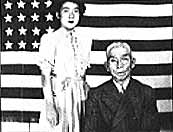|

|
Rea Tajiri

|
Lately I have been
having a lot of conversations about the issues Art and Tony
bring up with other makers privately, so, I'm glad to be participating
in a dialogue such as this one publicly. There are limited
opportunities for speech on the one hand and, on the other,
we need to pay attention to the issue of how, as makers of
color, our speech will be framed.
For instance, even
though I'm glad to be participating in this dialogue, in many
ways I've had a hard time writing a response. I get caught
up and painfully aware of my own reluctance to speaking in
public forum, scrutinizing the context, framing, and how the
art industry might have me packaged and summed up neatly before
I get the words out. There is a lot of anger unexpressed that
I have about the art world in general – the various mechanisms
that operate flip/flop out of control that I feel controlled
by.
Regardless of the
noise that continues inside my head, I think it is really
important that we focus on attempting to control, define,
and create our own context for our work, begin to articulate
all of these fears as concerns and, at the same time, develop
a language for criticism on these issues. Being sort of grouped
together in the voices-from-the-margins-type show limits and
generalizes the readings on our work and continues to set
up a marginalized, out-of-the-mainstream status. In the mean
time what all of us are dying for is to get some serious writing
done about our work, aesthetics and issues.
|

|
One thing I will
say about the whole multicultural thing (and it's gotten to
the point where I really have a hard time even using that
term anymore) is that it's finally acknowledged our presence
as makers of color. If we're being used, then somehow it's
up to us to also use this whole thing to our advantage. If
it allows us to get the work made, if it allows us to get
the work out there, if it allows us more visibility at least
to one another, then it's been beneficial. I do think it's
opened up a channel for some kind of dialogue and consciousness,
made our identities stronger and clearer for us, allowed us
to grow and develop collectively. We all have to retain awareness
of that fact while also being aware that (although video work
has always been one of the harder art forms to commodify)
we're still packaged like any other commodity and, as artists
of color, we're part of the latest marketing trend.
|
|
One of the more
painful and difficult things, and something we have to address,
is the tensions between white makers and makers of color in
terms of funding. Right now I've heard several makers complain
about how most of the funding is now going towards makers
of color and they question whether or not we're receiving
these accolades on the basis of any real quality in the work.
A couple of cynical asides by white colleagues have been made
in front of me (telling me of course they're only joking)
referring to how all the jobs in the academic world have been
going to pocs, and as to how the extinction of the white male
is imminent in the funding game. This kind of thinking sort
of assumes that there's been some kind of reversal as though
somehow makers of color are now part of a power elite. Are
we taking over? The problem should be focused on the realities
of a system that exists, one that's always been in place,
which allows for only a few to receive awards and others to
be displaced. And also the problem should be focused toward
the realities of our ever shrinking pool of arts funding.
It seems as though the hostility is misdirected, since in
the mean time there are many makers of color who have yet
to receive their first grant check.
The other issue
I'd like to raise is that those of us who have received some
degree of recognition or "acceptance" are questioning what
that really means? Accepted by whom, for what audience, who's
seeing the work and who are we really speaking to? What happens
to our work seen in a mainstream venue? And then, once the
few of us are allowed to squeeze through and are "rewarded,"
are we allowed to fail? Being given this "privilege" our abilities
are always scrutinized and questioned. Somehow, even trying
to succeed within this context carries with it certain pressures
and conditions.
Reflecting back
on what Art Jones says, we probably need to think a bit more
about the power relations behind the whole multicultural movement
and that "multiculturalism is the latest spin on the same
old history," especially if it ignores or refuses to examine
the power relations and the realities of classism and racism.
|
|
|